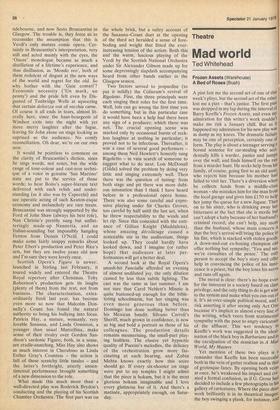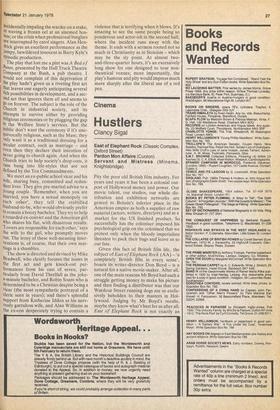Mad world
Ted Whitehead
Frozen Assets (Warehouse) A Bed of Roses (Bush)
A pint lost me the second act of one of this week's plays, but the second act of the other
lost me a pint — that's justice. The first pint
was dropped in my lap during the interval of Barry Keeffe's Frozen Assets, and even mY
admiration for this writer's work couldn't make me risk a January chill. But as It happened my admiration for his new play was as damp as my knees. The dramatic failure
may be one of perception, certainly one of form. The play is about a teenager serving8
borstal sentence for car-stealing who aca dentally kills a warder, panics and jumps over the wall, and finds himself on the run from a murder hunt. He seeks help from lus
family, of course, going first to an old aunt, who rejects him because his mother had
failed to visit her. There's a diversion when
he collects funds from a middle-class woman — she mistakes him for the man from the local garage and gives him £.150 to hell) her jump the queue for a new Jaguar. Then on to his sister, who is drinking away her bitterness at the fact that she is sterile but can't adopt a baby because of her husband's criminal record; she can't help, any more than the husband, whose main concern Is that the boy's arrival will bring the police to his flat, which is stacked with stolen goods. A down-and-out ex-boxing champion car] offer nothing but sympathy: 'You and me, we're casualties of the peace.' The ontY person to accept the boy's story and offer help in convincing the police of his inno' cence is a priest; but the boy loses his nerve and runs off again.
The moral is clear: there's no hope even for the innocent in a society based on class privilege, and the only thing to do is get wise to the system and make what you can out of it. It's an over-simple political moral, and I risk asserting it after seeing only Act Orle, because it's implicit in almost every line of the writing, which veers from sentimental sympathy with the poor to angry caricature of the affluent. This wet tendency in Keeffe's work was suggested in the ideal' isation of the black boy in Barbarians and ill the exculpation of the musician in A Mad World, My Masters.
Yet mention of these two plays is 0 reminder that Keeffe has been successful both in the vein of gutter realism and in that of grotesque fancy. By opening both veins at once, he's weakened his impact and ere' ated a formal confusion, as if G. Grosz had decided to include a few photographs in his gallery of caricatures. Where the piece does work brilliantly is in its theatrical images: the boy swinging a plank, for instance, and accidentally impaling the warder on a stake, or waving a frozen eel at an alarmed hostess; or the crisis when professional burglars are interrupted by carol singers. Alan Hendrick gives an excellent performance as the jumpy, bewildered innocent in Barry Kyle's episodic production.
The play that lost me a pint was A Bed of Roses, presented by the Hull Truck Theatre Company at the Bush, a pub theatre. I would not complain of this deprivation if the play hadn't given us a riveting first act that leaves one eagerly anticipating several rich possibilities in development, and a second act that ignores them all and seems to go on forever. The subject is the role of the Church in industrial society, and its attempts to survive either by providing religious ceremonies or by plugging the gap in the Welfare State's services. But the Public don't want the ceremony if it's unequivocally religious, such as the Mass; they only want it as a traditional dressing for a secular contract, such as marriage — and even then they declare their intention of never going to church again. And when the Church tries to help society's drop-outs, it runs bang into life-styles that are not defined by the Ten Commandments.
We meet an ex-public school vicar and his Wife, sharing busy, committed and redundant lives. They give pre-marital advice to a Young couple. 'Remember, when you are Married, you have a sexual monopoly on each other', they tell the stultified husband-to-be, who would obviously prefer to remain a boozy bachelor. They try to help a retarded ex-convict and the American girl Who shares his flat, with disastrous results. 'Lovers are responsible for each other,' says the wife to the girl, who promptly moves out. The irony of these well-meaning interventions is, of course, that their own marriage is a shambles.
The show is directed and devised by Mike Bradwell, who clearly focuses the issues in the first act and gets knock-out performances from his cast of seven, particularly from David Threlfall as the jokea-minute bachelor, and Robin Soans who is determined to be a Christian despite being a vicar (the most sympathetic portrayal of a Cleric seen in years); and there's splendid support from Katherine Iddon as his nervously garrulous wife, and Alan Williams as the ex-con desperately trying to contain a violence that is terrifying when it blows. Its amazing to see the same people being so ponderous and actor-ish in the second half, where the incident runs away with the theme. It ends with a sermon rooted not so much in Christianity as in Stoicism — which may be the sly point. At almost twoand-three-quarter hours, it's an excessively long show for one designed to tour nontheatrical venues; more importantly, the play's humour and pity would impress much more sharply after the liberal use of a red pen.



































 Previous page
Previous page